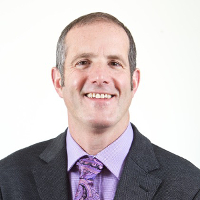Greetings from CPIP Executive Director Sean O’Connor

As January 2020 draws to a close, I hope you have had a restful holiday season and a good start to the new decade. At CPIP, we are pushing forward with plans for an exciting new year, getting ready for some internal changes, and looking forward to the future.
In early December, I traveled to China to lecture on music law at Tsinghua University School of Law in Beijing and to meet with lawyers in firms and corporations regarding IP in China. At Mason, our students are back from the winter break and I am leading the second semester of the newly initiated Innovation Law Clinic. I am excited to announce that the Clinic is collaborating with BizLaunch, a unit of Arlington Economic Development, to assist entrepreneurs and advance Arlington as an innovation district—especially in preparation for Amazon’s impending arrival. Starting this semester, BizLaunch and Mason will be co-hosting a series of lectures and clinical sessions, entitled Mason Law Clinic @ BizLaunch, which will provide local entrepreneurs with ready access to legal information and assistance.
This past week, the CPIP team traveled to Miami Beach, Florida, for the fourth and final meeting of our Edison Fellowship for 2019-2020. We would like to thank our scholars and senior commentators for their investment of time, hard work, and generous feedback over the past year.
Looking further ahead, please note that CPIP’s The Evolving Music Ecosystem conference will now be a two-day affair, taking place at Scalia Law School in Arlington, Virginia, on April 23-24, 2020.
On a staffing note, you may have read in a CPIP email from last week that CPIP Deputy Director Kevin Madigan is leaving our team to join the Copyright Alliance as VP, Legal Policy and Copyright Counsel. Kevin has been an invaluable part of our team over the past four years and he will be greatly missed. Kevin’s contributions to CPIP are irreplaceable.
We look forward to continued work with him in his new role at the Copyright Alliance and we wish him all the best. Due to Kevin’s departure, we are now looking to hire a new Deputy Director. The job listing can be found here. Please circulate widely to help us fill this important CPIP position!
Registration Now Open for Music Law Conference on April 23-24, 2020

Registration is now open for CPIP’s music law conference, The Evolving Music Ecosystem, that will be held at Antonin Scalia Law School in Arlington, Virginia, on April 23-24, 2020. The keynote address will be given by Rosanne Cash, and it features two days of panel presentations from leading experts.
This unique conference continues a dialogue on the music ecosystem begun by CPIP Executive Director Sean O’Connor while at the University of Washington School of Law in Seattle. In its inaugural year in the D.C. area, the conference aims to bring together musicians, music fans, lawyers, artist advocates, business leaders, government policymakers, and anyone interested in supporting thriving music ecosystems in the U.S. and beyond.
Please click here to register, and click here to visit our conference website. We’ll be announcing the agenda and confirmed speakers soon!
WIPO-CPIP Summer School on IP on June 8-19, 2020

CPIP has again partnered with the World Intellectual Property Organization (WIPO) to host the third iteration of the WIPO-CPIP Summer School on Intellectual Property at Antonin Scalia Law School in Arlington, Virginia, on June 8-19, 2020. Registration is now open, and we recommend that participants apply early, as we expect the program to be full.
The course provides a unique opportunity for students, professionals, and government officials to work with leading experts to gain a deeper knowledge of IP to advance their careers. The course consists of lectures, case studies, simulation exercises, group discussions, and panel discussions on selected IP topics, with an orientation towards the interface between IP and other disciplines.
Please click here for more information.
Spotlight on Scholarship

Eric Claeys, Claim Communication in Intellectual Property: A Comment on Right on Time, 100 B.U. L. Rev. Online 4 (2020)
In this paper that was supported by a CPIP Leonardo da Vinci Fellowship Research Grant, CPIP Senior Scholar Eric Claeys responds to a recent article discussing how original acquisition applies to intellectual property law and policy. Prof. Claeys explains that property rights help people to derive value from ownable resources and to coordinate the behavior of different people. Through what he calls “claim communication,” property rights inform people about who gets priority in managing and producing value from the asset. Prof. Claeys argues that this distinct function of property rights is integral to understanding how original acquisition applies to intellectual property.
Jonathan Barnett, The ‘License As Tax’ Fallacy (forthcoming)
In this forthcoming paper, CPIP Senior Scholar Jonathan Barnett rebuts claims that intellectual property licenses act as a “tax” that limits access to technological assets, stunts innovation, and inflates prices for end-users. Such claims have motivated competition regulators and courts to take a skeptical view of intellectual property licensing. Prof. Barnett explains that this skepticism overlooks how licensing supports a robust innovation ecosystem by facilitating exchanges that create value, promoting the division of labor, and lowering entry costs for innovative firms.
Activities, News, & Events

Earlier this month, a group of intellectual property scholars, including Sandra Aistars, Devlin Hartline, Kevin Madigan, Adam Mossoff, Sean O’Connor, and Mark Schultz, filed comments with the U.S. Trade Representative in advance of its hearing to review the generalized system of preferences (GSP) eligibility of several countries. The GSP program provides for the duty-free importation of designated articles into the U.S., and the U.S. Trade Representative is considering whether South Africa is meeting its eligibility criterion by providing adequate and effective protection of U.S. intellectual property rights. The comments submitted argue that South Africa’s copyright regime fails to adequately protect U.S. copyrighted works, and that proposed changes to its law that would greatly expand fair use and fair dealing would only exacerbate the problem.
CPIP Director of Copyright Research and Policy Sandra Aistars testifies today at the U.S. Trade Representative hearing on the GSP eligibility of South Africa, where she is discussing how South Africa fails to provide adequate and effective protection for U.S. copyrighted works. The work of Prof. Aistars’ Arts & Entertainment Advocacy Clinic in helping to protect artists and authors was featured in a recent article at Scalia Law News. Prof. Aistars will be speaking next month at the 94th Annual CMPA Convention in South Carolina, and she will be panelist at the Copyright in the Age of Artificial Intelligence event that is being co-hosted by the U.S. Copyright Office and WIPO in Washington, D.C. Prof. Aistars will also attend the 2020 CSUSA Midwinter Meeting in Arizona, where she will participate in an executive committee meeting to decide issues affecting the organization.
CPIP Senior Scholar Kristen Osenga recently published an essay at the Hudson Institute entitled Saving Functional Claiming: The Mismatch of § 112 Reform in the § 101 Reform Debate. In the essay, Prof. Osenga explains how the proposed revisions to § 112(f) that were included in a recent bill to reform patent subject matter eligibility under § 101 would result in negative consequences for innovation. § 112(f) is the statutory provision that governs functional claiming, and the amendment would narrow it out of concerns over preemption. Prof. Osenga explains that this change actually reduce the effectiveness and reliability of patent rights for all innovators. Prof. Osenga also co-authored a white paper for the Federalist Society’s Regulatory Transparency Project entitled Putting the Public Back In “Public Interest” in Patent Law. The white paper explains how recent interference in the patent system by several administrative agencies fails to promote the public interest that the patent system is intended to serve.